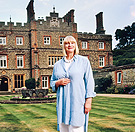Interview: The country-house inspector
Ruth Watson shares her experiences of entering 'asset-rich', 'cash-poor' family homes which could do with a helping hand


Exquisite houses, the beauty of Nature, and how to get the most from your life, straight to your inbox.
You are now subscribed
Your newsletter sign-up was successful
Ruth Watson has already sent a ripple of terror through the hotel industry with her popular Channel 5 series, The Hotel Inspector. Now, in a move to Channel 4—described by The Guardian as the most significant channel hop since Graham Norton defected 10 years ago—she appears in Country House Rescue, tackling six mainly ‘asset-rich, cash-poor’ family homes that could do better.
Ruth says that she hasn’t tempered the whirlwind style of kindly bossiness with which underperforming hoteliers were put in their place and viewers entertained—‘You could shut down 10,000 hotels and guest houses and not notice, there’s so much rotten bed stock in this country’—and admits that not all of her suggestions have been well received. ‘Resistance is normal. I think that if someone came into my home, I’d be angry and upset, as it is intrusive. But, once you’re through that painful period, things usually knit together.’ She is both unrepentant—‘People have hair-brained schemes, really they can be quite demented’—and resigned, knowing only about 50% of her advice is acted on. ‘If someone has been doing something that way for ages, they tend to carry on. I know that once [the television cameras have] left, the impetus can be gone.’
She reveals that, in the series, Country Life garden writer Mary-Anne Robb was unimpressed by Ruth’s comments on the placing of the loos, plant centre and tea-rooms at Cothay Manor, her Somerset garden.
‘They get about 5,000 visitors when they could get 20,000, because it’s lovely. We suggested that instead of the usual notices about opening hours, they announced when the best week would be for tulips, or roses, so that people can see that the garden evolves and have a reason to come back. Lots of people go more than once to Sissinghurst or Great Dixter to see different f lowers in bloom, or a new border.’ A Scottish landowner who wants to open a brewery has been advised to start small to see how it works. ‘I told him that the ale business is in meltdown; the zeitgeist isn’t right.’ A Surrey estate with a £4.5-million overdraft has a residential old-people’s home, which, as space becomes free, the owners want to turn into apartments.
‘The problem was that potential buyers weren’t seeing beyond the old people’s home. There was no overall strategy and no show flat, but the wife has done a great job with that and is now very grateful. Ruth, all statuesque blonde bob, pink lipstick and unstoppable chat, does not, she says, put on a special television persona. ‘I’m like this all the time,’ she explains, her high velocity speech startlingly punctuated with a few four letter words. ‘What you see is what you get. In the first series of Hotel Inspector, I was told to be very angry, but I refused—I’m not going to put on an emotion I don’t feel.’
Westonbirt-educated, Ruth started life as a food writer. She was an inspector for The Good Food Guide, and has written The Really Helpful Cookbook,Fat Girl Slim, and Something for the Weekend. With her husband, David, she bought Hintlesham Hall in Suffolk from Robert Carrier, then opened one of the first gastropubs, the Fox and Goose at Fressingfield. Since 1999, they have owned the Crown & Castle at Orford— which has two AA rosettes and a Michelin gourmand bib— plus an acclaimed village pub. ‘Television isn’t my raison d’être, but I’m not unaware that it attracts customers. It does have its downside. People think “Who does she think she is?” and the spotlight is on us.’ David is, she says, a ‘great strategist’. He acts as business advisor on location for Country House Rescue and ‘calms people down off-camera when they’ve become agitated’. At Elmore, the Gloucestershire estate left to a young trance-music DJ, David queried why an expensive firm of London solicitors was being paid to collect rents. ‘He suggested they employed someone, which saved them about £70,000 in an instant. He can look at accounts and go “boom, boom, boom—that’s what you should do” in the same way I can with a kitchen.
‘None of what I say is, I hope, specious nonsense. I’d like to think that people realise I’m genuinely there to help them, but they must realise that it does have to be entertaining. I never want anyone to say “She came in, looked at us and then buzzed off.” We do a hard-core job and our advice isn’t trivial.’
Exquisite houses, the beauty of Nature, and how to get the most from your life, straight to your inbox.
Country Life is unlike any other magazine: the only glossy weekly on the newsstand and the only magazine that has been guest-edited by His Majesty The King not once, but twice. It is a celebration of modern rural life and all its diverse joys and pleasures — that was first published in Queen Victoria's Diamond Jubilee year. Our eclectic mixture of witty and informative content — from the most up-to-date property news and commentary and a coveted glimpse inside some of the UK's best houses and gardens, to gardening, the arts and interior design, written by experts in their field — still cannot be found in print or online, anywhere else.
